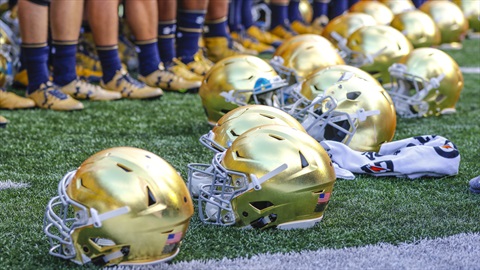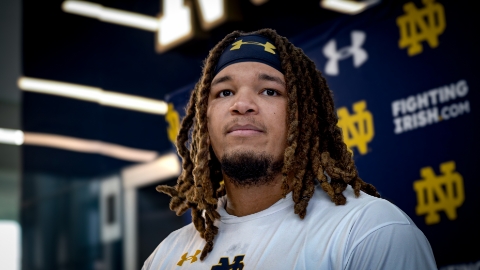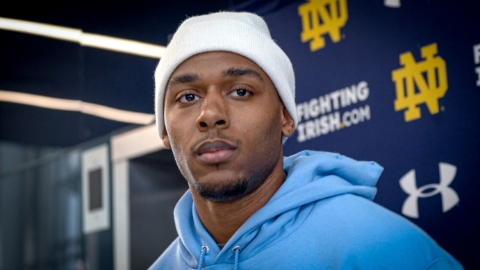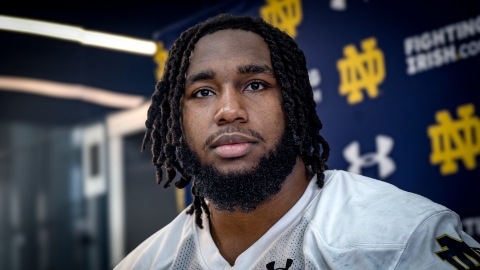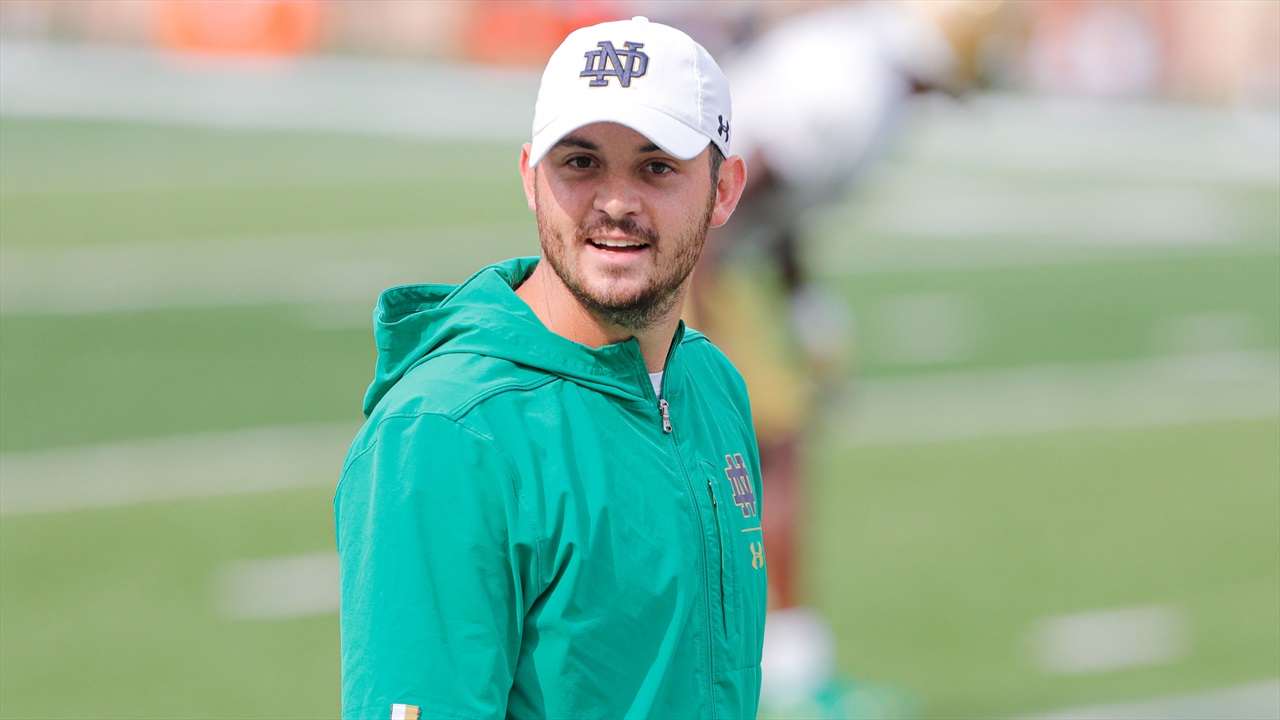
Notre Dame offensive coordinator Tommy Rees spoke on Wednesday afternoon as the Irish wrapped up its 2021 recruiting class.
On development within the Notre Dame program:
”I know Eric, I think you asked Mike about Ade, there's a great example of a three-star recruit came in here, played his way, developed over a couple of years, changed his body, became a starter and then was on full display last weekend at the Senior Bowl, where there was plenty of buzz that he generated through his work.
“I think if you look over the years Coach Kelly's been here, there's been a number of three-star guys for whatever those rankings even mean that have been committed to this program and have succeeded and gone on to the next level and made a huge difference. So, we had guys like Wu, who was here last year, winning most prestigious award any linebacker can win. That's a three-star recruit who came in here was undersized on the scout team our first year, developed into an All-American and hopefully a first-round pick.
“You look at a guy like Julian Love from Nazareth in Chicago. A tremendous young man who came in here, might not have had a position and ended up being a great corner for us.
“Guys I played with Nick Martin and Tyler Eifert, three-star recruits come in here and end up being All-American starters, go on to have great NFL careers. So, I think when it comes to this program and what Coach Kelly has developed over the last decade here is really a program where we are committed to developing these guys holistically, creating great football players, but also great men off the field. Guys that we can all be extremely proud of.”
On deciding to take quarterback Jack Coan:
”We are always in the business of creating competition and making this team better. We had an opportunity here with the numbers to add a quarterback to our roster. We felt like there was a need for a veteran presence in the room. Obviously, contrary to popular belief, we were spoiled here for the last five years with Ian Book, and we had an opportunity to add a veteran; a guy that could come in help the younger players come in and provide some guidance, come in and make our team better. And then also, like I started with add competition to make the room better.
“I don't think many people know this, but the exciting thing for me was when I had the conversation with the other quarterbacks that we are going to be bringing in a grad transfer, to a man, they all were excited about the opportunity to bring in a veteran that can help improve them, that can help make them better, that can help add competition to the room. The short time I've been around Jack and the conversations we had leading up to now, he is an extremely mature young man. He was one that has won a lot of football games in a very competitive conference.
“Since the day we first talked, he has been nothing but very mature and business-like in his approach. We're extremely excited to add him to the group and to get to work in here later in March.”
On the importance of having an older QB like Jack Coan on the roster:
”I think it's huge, man. I think, just having a guy that's played in big games, played in the Rose Bowl, played in the Big 10 Championship, led a team to those situations. Having a guy that's been around high-level college football. You look at the room right now and we're young and we're even younger in terms of the playing experience. The new age of quarterback play where guys are leaving every year and all of that, you need to add veterans to your room, and you need to add the right ones more importantly.
“We definitely added the right one in Jack. Like I said earlier, he is an extremely mature kid. He's worked his tail off to put him in a great position here at Notre Dame. He's somebody that I'm eager to work with and pick his brain while also helping him understand what it means to play quarterback at Notre Dame and grasp this offense.
“But he's a guy, like I said earlier, it's going to be invaluable to those younger players to see how he works, to see how he prepares, to see how he studies, to see his leadership qualities shine through because the best way to learn is through example. And I think that he is going to continue the great veteran presence that we've had here in the past and he'll continue to be a good sounding board and a good mentor to some of those younger guys.
“Like I said the most exciting part of this whole process for me was to talk to Tyler, talk to Drew, talk to Brendan and talk to Ronnie. We talked to those guys about the decision to take a grad transfer and to hear their eagerness, to get working with him. To see Drew and Jack meet and them dap and hug up like it's not the first time they've met. Jack was reaching out to these guys while we were on vacation to build a relationship. That's huge. And like I said earlier, I think it's important that you add a veteran presence, but it's even more important that you add the right veteran presence.
“And I feel Jack is definitely going to provide that for us.”
On evaluating high school quarterback prospects:
”Everybody always talks about quarterbacks having that It Factor. What makes the difference between Tom Brady and the other guys drafted ahead of him? I think at this level, where you start is with the physical attributes, there's a certain threshold, right? There's a certain threshold that you're either above it or you're not. And once you're above it, you're talented enough to play at this level. For me and our staff and our job, Pat Kramer does a great job of supplementing us in this is. 'What can we do to find out the intangible qualities? because those are not able to be measured on film. Those are not being able to be measured in camps.
“The first thing I want to know is do they love the game of football. So, when you're talking to a recruit, you just start there and we have different ways to do this, but there are ways to just ask them about the games that were played on Sunday. Throw them a curveball and ask him where Tom Brady went to college. Ask him who was in the College Football Playoff from a year before. I asked him if he saw the game on Thursday night, right? So, there are different ways to see is he watching the game? Is he following the game? Does he love the game of football? Because at this position you need to in order to be committed to being the best version of yourself.
“The other thing that we can do is there are different ways to see cognitively how well they can learn, adapt, pick things up in a short period of time. Something I was fortunate to be a part of was the NFL Combine when I was with the Chargers. Being able to see in those quick meetings, being able to teach a concept or two or a formation and take the sheet away and see how the retention was of those quarterbacks and seeing how well they could process it and then be able to verbalize it back to you.
“When you start to find those layers out about players, you're able to start differentiating guys that are similar in their physical traits and where they are, but this might give one guy the edge over another. Then another thing, which I think is invaluable is when you're talking to a quarterback, obviously you go through their school and you talk to their coaches and other people in the business and in their schools, but talk to their rival, talk to their opposition. What does the opposing coach think of this kid? What have they heard? What are they game-planning for? What type of competitor is he? And those are things that are extremely important because, if an opposing coach is going to speak extremely highly of them, then he's probably the type of kid that you want.
“Tthe third part of that is, multiple sports, right? I think the more you can see a kid playing basketball, playing baseball, competing another in another realm, it's invaluable. If you're the Division-I quarterback at a high school, you should be good enough to be in the top seven of your high school basketball team. You should be a good enough athlete, right?
“You should be playing baseball; you should be doing something else. You may not be the star on the basketball team. You may be a role player. But that teaches you how to be a different type of teammate. It teaches you about being selfless. It teaches you how to compete and take ownership of a different role and ultimately that's going to help you, where you're the star and that's, most likely the quarterback of your high school team.”
On early enrollee QB Tyler Buchner:
”Feels like we've been recruiting him for 10 years, but we're extremely excited to get him, finally here. Obviously, it's been a great process to get to know he and his family. They're wonderful people.
“The thing that jumps out about Tyler is similar to what we just talked about, those intangible things that you may not see on film, which is fantastic. His test score coming out of high school through the roof, and his ability to retain information and almost a like weirdly smart way where it's borderline photographic and he's able to retain things and spit them back to you. The way that his peers, his high school coaches, people spoke about him in the area, the maturity level that he carries himself with on a day-to-day really encompasses everything we're looking for in a quarterback at Notre Dame and we're extremely excited to get to work and finally get him on the campus.”
On balancing film and watching a kid throw live and how COVID has impacted that process:
”One thing here in a normal year, obviously you're out on the road and there's other ways to evaluate players. I think obviously a big part of it is being able to see them throw. There's a difference between evaluating on camera and then evaluating in person or through a workout tape and I would say that the great thing about the time right now is all of these kids and credit to their high school coaches or their trainers, they are putting together Pro Day-type videos where it's a field level behind the quarterback, bird's eye view of the whole field and you're able to see different angles of the throw. It almost gives you a live audition.
“In years past, we put a huge emphasis on the ability to bring as many great players to camp as we can. Because we want to see these quarterbacks throw live. That's a huge part of the evaluation, but that being taken away from us, how do we supplement it?
“These kids and their coaches and their trainers have done a wonderful job of understanding that, knowing that, and then being able to supplement it with workouts. And again, it's not ideal, it's not perfect. We still have to work through it. You have to a little bit go with what on the tape, what on the workouts, trust how you can put them side by side and compare them.
“And then again, that's when those intangible things start to differentiate one guy from the next.”
On what Tyler Buchner needs to do to play as a true freshman:
”Look, it's going to be a process, right? We have an extremely talented group in the quarterback room. We're excited about all the guys and their opportunities to help us win games.
“At the end of the day, playing the quarterback position is about putting your offense in positions to win. It's putting your offense in positive plays one after the other. It's about leading the team down the field, stringing together first downs and putting points on the board.
“So whichever quarterback in our group is able to do that most successfully is going to have a chance to play here. We are in an open competition. We have the ability to evaluate all of our guys and allow them to showcase their strengths and give them an opportunity to lead this offense. And again, we are never shy about adding competition to this group. It's going to be an extremely competitive year and I do believe that brings out the best in guys. I can't tell you how excited I am just to get going and start this new chapter.”
On changing a quarterback throwing motion and/or mechanics:
”I think there's definitely a fine line when it comes to quarterbacks and mechanically where you want to center your focus and where you want to maybe shy away from a little bit.
“The first example, you watch Philip Rivers throw a football, it is not your classic three-quarter release. But nobody's changing Philip Rivers' release point. I think there are other parts of, not him, but individual's games where you start to look, 'Hey, where can I take her and make little improvements?'
“For me, it's pretty much from the base through the core and then making sure target line eyes, body position are all set. It is less about release point and more about making sure that we're able to get the base correct, to get the target line, work on the core, and then make sure we really get about to the shoulder. And that's for me where I tend to cut it off.
“You don't want to get into an area unless it's something really extreme where you're tinkering too much with how a kid's thrown a ball his entire life. He's thrown the football the right way for 18 years to get himself to Notre Dame. And I'm not talking Tyler specifically, I'm talking in generalities here.
“So, if we feel like there's something that needs to be altered there, then we probably didn't do our job in the evaluation period. So, it's our job to help them improve footwork, base, core, target line, those areas and then allows them to be more accurate and play on the time.”
